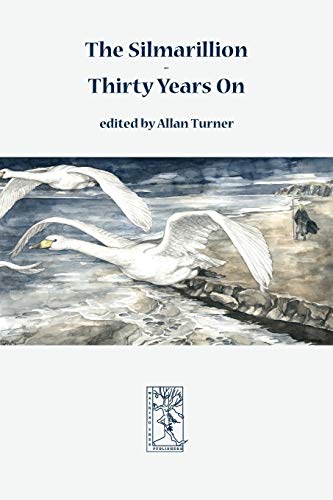onthetrail wrote:
What I am finding with Tolkien studies is that academics or general writers are finding subjects that are increasingly further and further away from the core subject matter at hand. Maybe it comes down to Tolkien being so well documented but these what I would call secondary publishers are welcoming almost any angle at this point, if it has Tolkien in it.
Not sure I would call friendship very far away from the core matter and or themes of LOTR.
Mr. Underhill wrote:
onthetrail wrote:
What I am finding with Tolkien studies is that academics or general writers are finding subjects that are increasingly further and further away from the core subject matter at hand. Maybe it comes down to Tolkien being so well documented but these what I would call secondary publishers are welcoming almost any angle at this point, if it has Tolkien in it.
Not sure I would call friendship very far away from the core matter and or themes of LOTR.
It isn't that far from the cores and themes of at least half the works of fiction ever written, mind. It is standard human condition stuff, really. How many stories aren't about friendship and conflicts in some combination?
Without knowing enough about this book specifically (and more replying to onthetrail), I do feel that there is a huge amount of faux-academic books where the tie-in to Tolkien is just to give a bit of credibility to the work and find an audience for something that probably wouldn't have one otherwise. Like I say, not commenting on this book as In have no idea from the blurb what this book is actually about.
Stu wrote:
Mr. Underhill wrote:
onthetrail wrote:
What I am finding with Tolkien studies is that academics or general writers are finding subjects that are increasingly further and further away from the core subject matter at hand. Maybe it comes down to Tolkien being so well documented but these what I would call secondary publishers are welcoming almost any angle at this point, if it has Tolkien in it.
Not sure I would call friendship very far away from the core matter and or themes of LOTR.
It isn't that far from the cores and themes of at least half the works of fiction ever written, mind. It is standard human condition stuff, really. How many stories aren't about friendship and conflicts in some combination?
Without knowing enough about this book specifically (and more replying to onthetrail), I do feel that there is a huge amount of faux-academic books where the tie-in to Tolkien is just to give a bit of credibility to the work and find an audience for something that probably wouldn't have one otherwise. Like I say, not commenting on this book as In have no idea from the blurb what this book is actually about.
I do agree with that Stu relationships and companionship are often the best parts of any good fiction writing. I have no idea if this book has anything new to say on the subject of friendship in LOTR. This may be one where I wait for reviews to come out on it before I buy it.
I did that with Science of Middle-earth and was glad I didn't pre-order it after the reviews came out.
Personally I find it difficult to judge the writings of analysis parallel to Tolkien's universe, when they are "generalists" it is quite clear and easy to interpret but when they are in a certain way "advanced", the perception of these writings remain discretionary to the sensitivity of the author and the reader towards his experience of reading the original writings. I think the important thing is not to judge but to see in it, an alternative to the personal vision of the author. And it is through all of these writings that we can see the depth and impact that the original writings have had on people through time.
I thought it would be difficult to beat the 'blurb' on the 1942 Foyles Hobbit in giving away nothing about the book or the author, but having recently got a copy of "Attacks of Taste" it is a clear winner on the dust-jacket 'blurb'.
I find books such as this are demonstrative of Tolkien's works having come to be perceived—entirely properly—as modern literature, and therefore worthy of the same criticism applicable to all modern literature. Reception criticism such as this—i.e., works reflecting the effect a work has on a reader—is, in regards to literary criticism, something that came to the fore with so-called postmodern literary criticism, and can reflect as many perspectives as there are readers. I think it's entirely encouraging as a sign of Tolkien having entered a 'canon' of sorts, one in which his works are considered as appropriate for such criticism as much as any other literary author's. It shows his works have been liberated from the walled garden—locked from the outside, of course—of fantasy fiction and have made it to the big leagues, so to speak.
Stu wrote:
Mr. Underhill wrote:
onthetrail wrote:
What I am finding with Tolkien studies is that academics or general writers are finding subjects that are increasingly further and further away from the core subject matter at hand. Maybe it comes down to Tolkien being so well documented but these what I would call secondary publishers are welcoming almost any angle at this point, if it has Tolkien in it.
Not sure I would call friendship very far away from the core matter and or themes of LOTR.
It isn't that far from the cores and themes of at least half the works of fiction ever written, mind. It is standard human condition stuff, really. How many stories aren't about friendship and conflicts in some combination?
Without knowing enough about this book specifically (and more replying to onthetrail), I do feel that there is a huge amount of faux-academic books where the tie-in to Tolkien is just to give a bit of credibility to the work and find an audience for something that probably wouldn't have one otherwise. Like I say, not commenting on this book as In have no idea from the blurb what this book is actually about.
Stu says better what I was getting at. Of course this book may be different but I will wait for reviews before I consider such a title. But if I can't fathom what a book is about from the blurb, I generally won't buy it.
I am often reading books, not just about Tolkien, and I leave with a sense that the book I held was better served as an article or academic paper at a third the length. In fact we have that, just recently, a journal entry about Tolkien's wife that became a publication. I have not read it, and maybe it adds to the wealth of research into Tolkien but it whiffs to me of gilding the lily at this point. What next? 350 pages about how smoking a pipe helped Tolkien create the character of Gandalf? I jest, it would only need 320 pages, plus an index of names of different tobaccos, a histopry of pipes and some sort of epilogue about "how Tolkien and Gandalf can help you quit smoking in 2022".
oxonianus wrote:
I find books such as this are demonstrative of Tolkien's works having come to be perceived—entirely properly—as modern literature, and therefore worthy of the same criticism applicable to all modern literature. Reception criticism such as this—i.e., works reflecting the effect a work has on a reader—is, in regards to literary criticism, something that came to the fore with so-called postmodern literary criticism, and can reflect as many perspectives as there are readers. I think it's entirely encouraging as a sign of Tolkien having entered a 'canon' of sorts, one in which his works are considered as appropriate for such criticism as much as any other literary author's. It shows his works have been liberated from the walled garden—locked from the outside, of course—of fantasy fiction and have made it to the big leagues, so to speak.
I had a similar feeling, but then I was invited to a reading circle that planned an event debating whether or not the black riders hinted at subconscious racism in the authors mind. Not all criticism has merit, but I'm not going to judge this book by its cover.
Has anyone else read the blurb on the back cover of the book? Any book that engages both the Nicomachean Ethics and the Summa Theologica isn't likely to be a puff piece. And just a little Googling shows that this book grew out of her 2018 master's thesis. Further, endorser Ronald Kyrmse is a well-known Tolkien scholar and critic.
Aelfwine wrote:
Has anyone else read the blurb on the back cover of the book? Any book that engages both the Nicomachean Ethics and the Summa Theologica isn't likely to be a puff piece. And just a little Googling shows that this book grew out of her 2018 master's thesis. Further, endorser Ronald Kyrmse is a well-known Tolkien scholar and critic.
Ronald Kyrmse helped translating the silmarillion into brazilian portugese also.


















 109
109 16606
16606